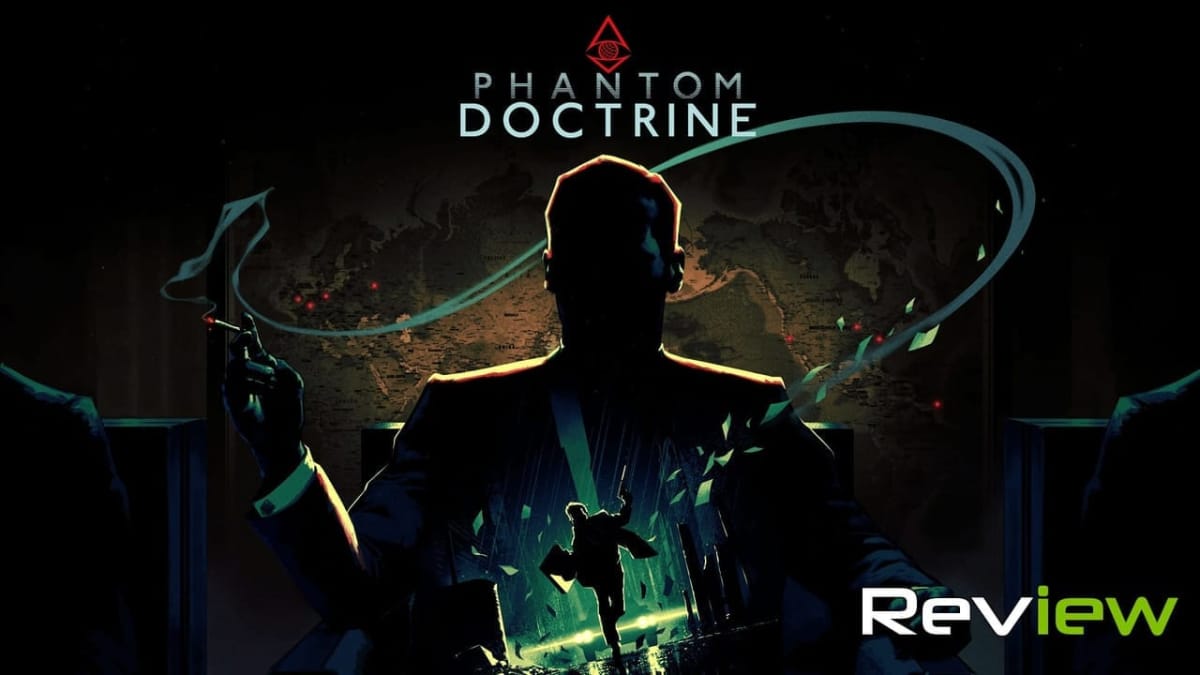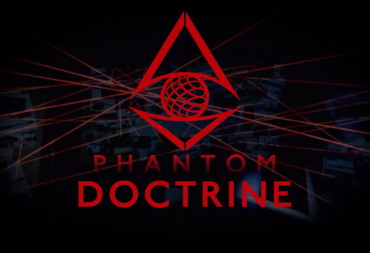All tactical games have their roots in chess, the paragon of turn-based gameplay. The rules and the pieces change, the scope grows, but the turn-based mechanic persists for centuries. Making the first move can put you at a disadvantage, which your opponent will exploit. The repercussions of your first moves will also impact your endgame. This primordial design lies at the core of Phantom Doctrine and its prodigiously intricate gameplay. This would be more than enough to make it a great game, and yet there’s so much more to it.
Phantom Doctrine is a tactical RPG and espionage simulator that puts you in control of a secret Cabal of spies. There are two gameplay modes: strategy and tactics. The strategy mode involves the broad surveillance of your spy network and base management with agent customization. The tactics mode involves the turn-based missions where you will have to infiltrate locations to either extract information or eliminate targets. Both of these modes are extremely well-designed and presented, with great graphics and UI.
It is 1983. The Cold War looms over a world split between CIA and KGB. You begin as a young agent in the organization of your choice, conducting a few local missions. Soon, you find yourself drawn into a web of conspiracies involving the cargo of a British ship. Although it feels like a pastiche of espionage thriller references and quite a few clichés, the atmosphere is spot-on. The narrative build-up keeps you on the edge even as it throws some MacGuffins your way. Most of the time, you’re chasing the phantom of the antagonist, an eccentric plotter with an ever-changing network of subversive agents.
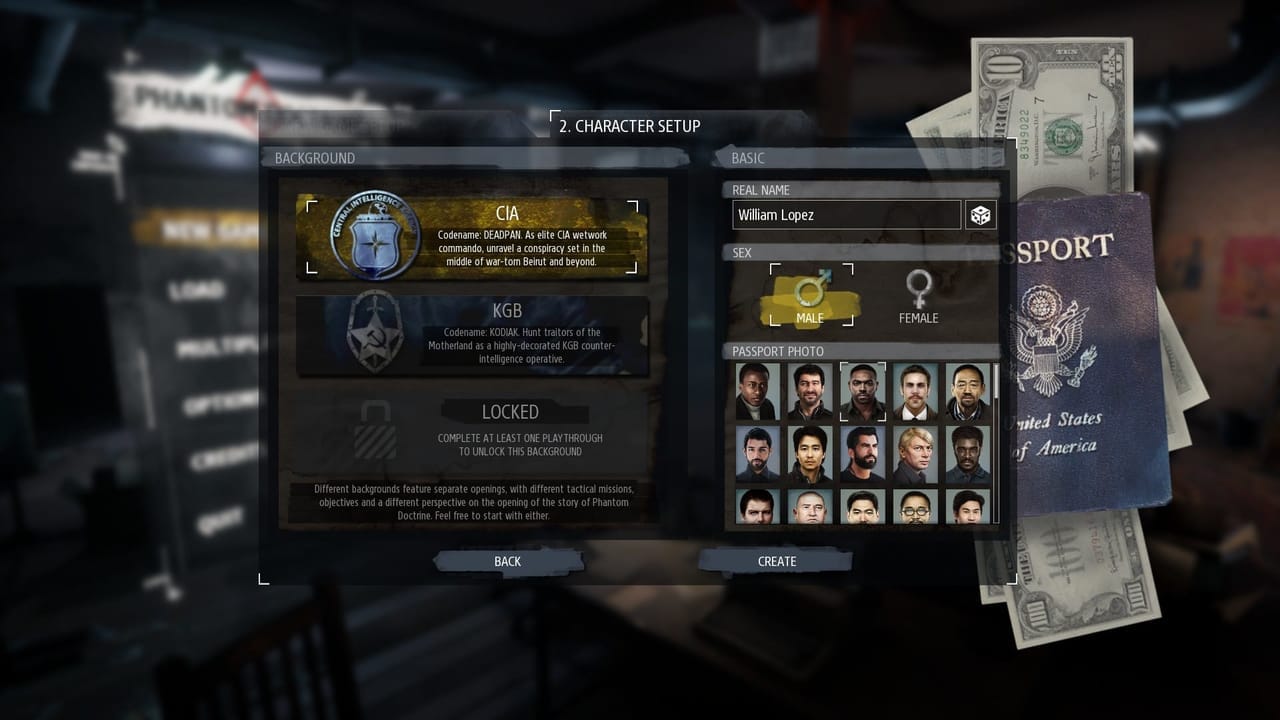
It's a monstrously complex game. It requires a major investment of time and focus to wrap your head around. It’s both hard to learn and hard to master, but it pays off with so many satisfying moments. The tutorial gives you a choreographed notion of the tactical gameplay that doesn’t match the messy, convoluted scenarios you find yourself in. That’s not to say you should just nod through it. If you do, you’ll miss out on important details that will help later on. If you just soldier on through the confusion, you’ll reap the rewards later on. The longer you persist, the more surgical and elegant your missions will become.
During the strategy stages you will spend most of your time overseeing a fairly simple world map where you chase leads, sending your agents to investigate and meet with informers. This takes place in a real-time supervision mode with a pause option. You will also deal with base management, where you oversee your operation and keep track of all the agents and the facilities. The basics include an Infirmary, a Workshop, and Analytics. You will spend many hours poring over the last one unless you decide to assign an agent to do the legwork of decoding intel files.
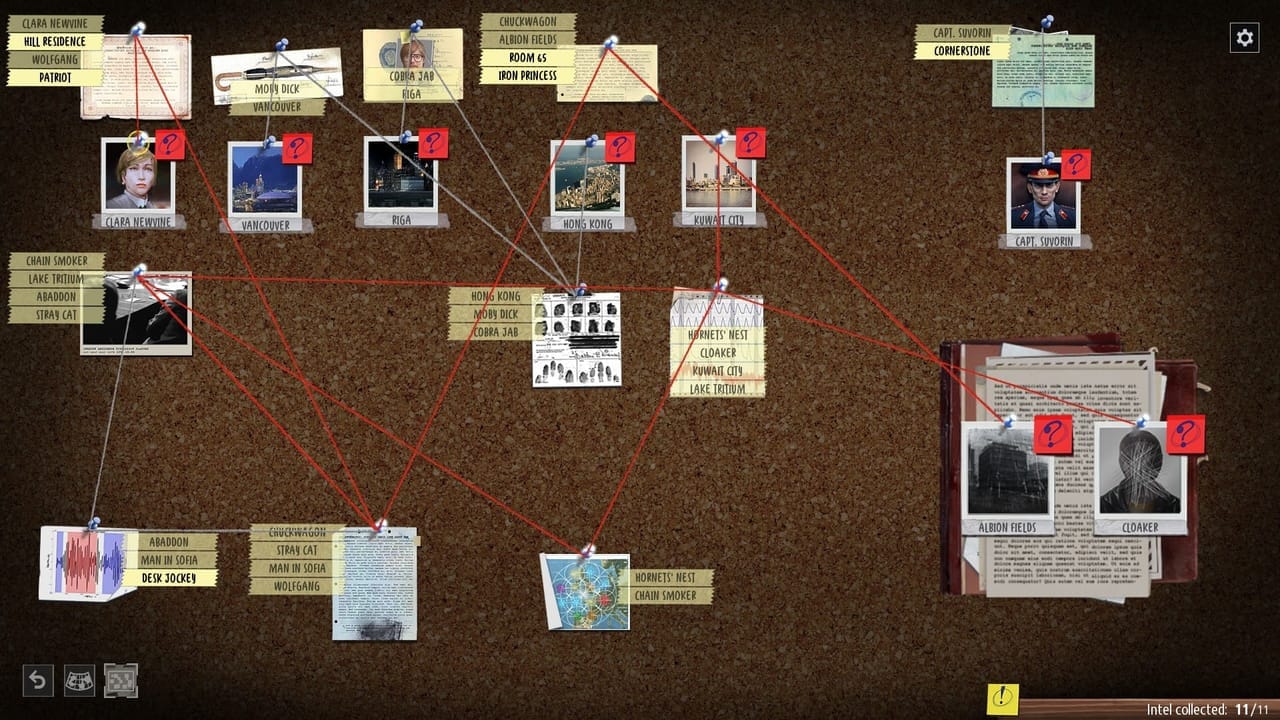
The Analytics facility has an exquisite minigame, a literal cork board with link diagrams for code words leading to places or individuals. While it is mostly optional, there is an incentive to do this busywork, as it leads to many worthwhile rewards. The gameplay at this point reminded me of Papers, Please, where you play as a border inspector cross-referencing documents of many types. Analyzing stacks of documents and connecting the dots is actually hard work, but both Papers, Please and Phantom Doctrine achieve the miracle of making it fun and compelling. It may get old after a few dozen hours, but there is still something remarkably satisfying when you connect all the codenames and pinpoint the name of a place or individual while also raking in some rewards.
The implementation of base building and expansion is a staple game mechanic, and Phantom Doctrine employs it flawlessly. Beyond that, there is also a robust and heavily detailed stat management system that will keep you engaged for many hours. Outfitting and enhancing your agents with training, perks, and body engineering drugs is addictively fun. Some agents are more suitable for combat, others for infiltration, and others for investigation in the world map. Everyone has a part to play in your Cabal, and it all fits organically.
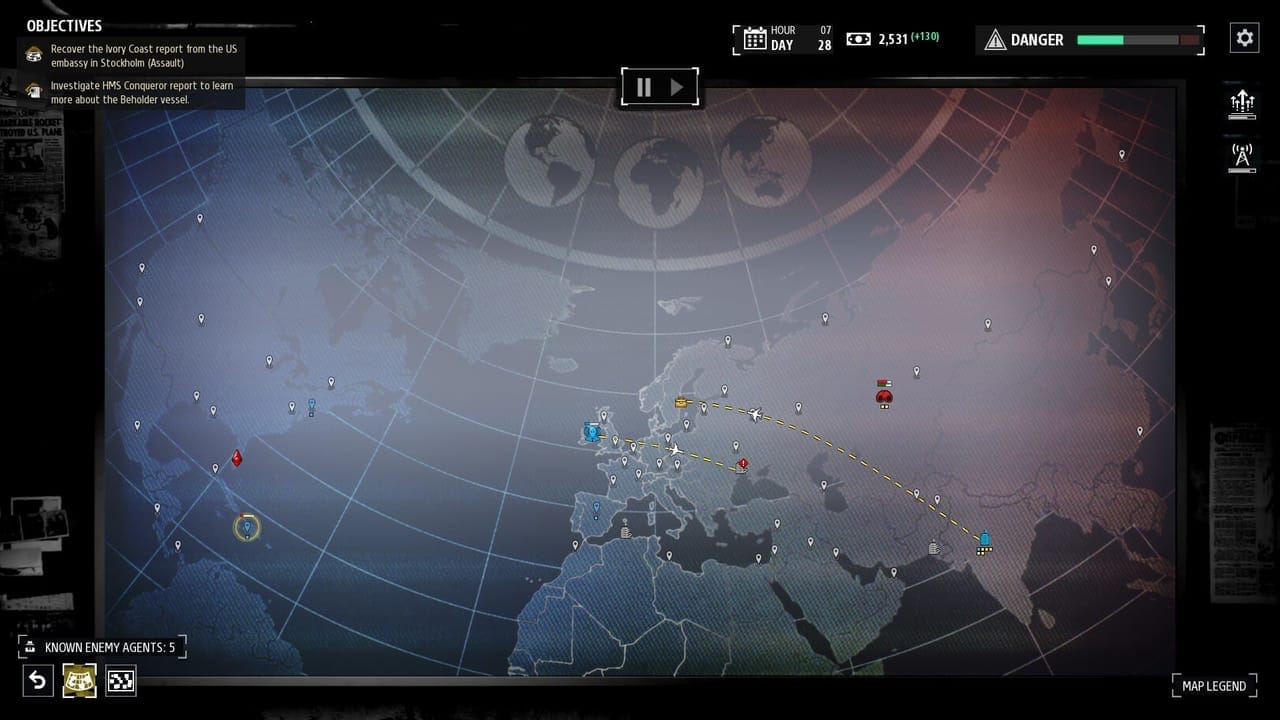
There will be moments when you realize you’ve been playing the game wrong in some ways. After investing many hours, you start to notice details and options you hadn’t noticed before. “Oh, so that’s how I do that!” This is not because of a lack of information. It’s because the amount of information is simply overwhelming, and it takes time to piece it all together into a coherent whole. When you finally do, you’ll want to play it for hours on end. There are so many ways to explore its systems and mess around with the possibilities for sabotage.
Later in the campaign, you’ll be able to capture enemy agents, brainwash them and turn them into sleeper agents. Once released, you might run into them again on a mission, then you can turn them with a trigger phrase and they will join your side. You can also make them saboteurs so they can just blow up an enemy cell and kill themselves, sparing you the trouble. There is something devilishly satisfying when you finally have your own network of rogue agents that you can keep track of, knowing you can use them whenever you want to. Of course, the same can also work against you, as the enemy can also turn some of your agents. You can even unwittingly recruit sleeper agents into your own fold. This keeps you on your toes along the way.
You don’t have to be a turn-based combat aficionado to enjoy the tactical gameplay of Phantom Doctrine. In fact, if you don’t like turn-based combat, I daresay that you just might begin to like it if you try this game. While it draws inevitable comparison to XCOM, it also took me back to classic Fallout, with a hint of Wasteland 2 in the mix. It’s more complex and flexible than both of them, but it has a similar feel. Your agents have perks and abilities that can influence and affect the combat directly. There are different ways to accomplish a goal, giving you a lot of agency as a player, with plenty of room for creative maneuvers.
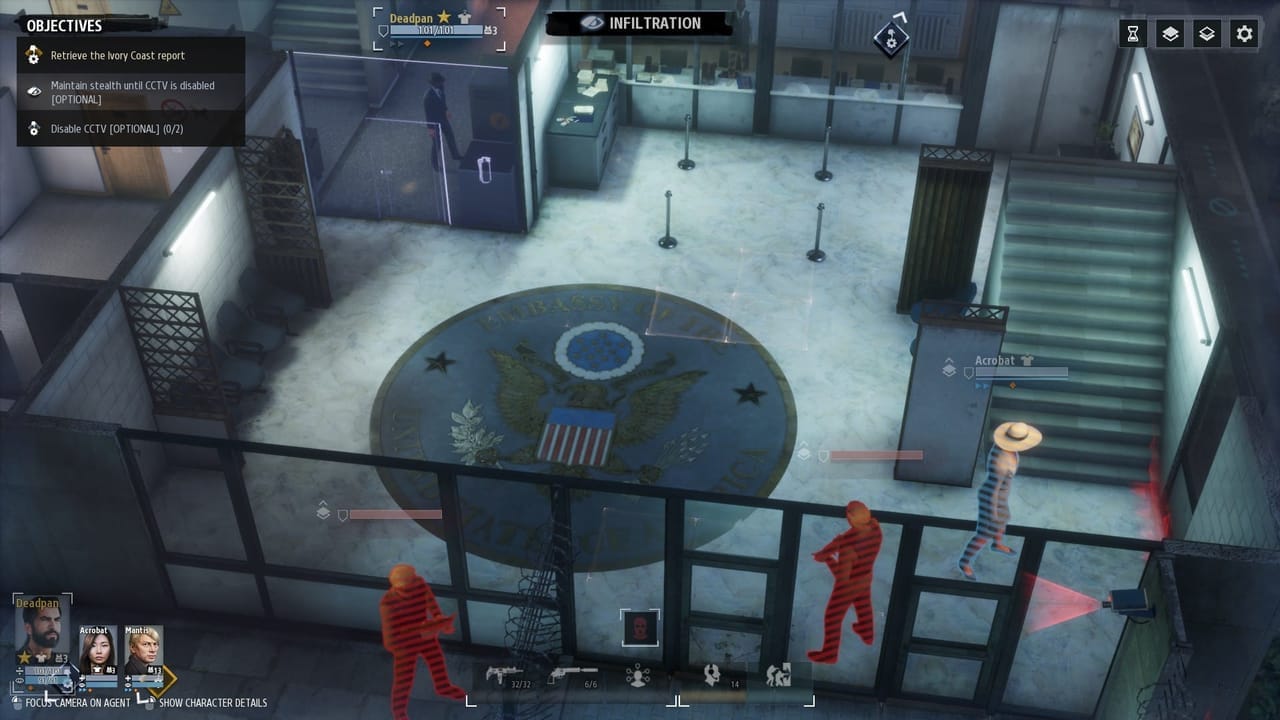
I felt very frustrated on my first ambush because I didn’t fully understand the systems regulating the combat. The main factor that may decide a battle is the Awareness bar, which determines the likelihood of a hit. The higher their Awareness, the better your agents can prevent or diminish the impact of an assault from the enemy. Likewise, shooting at enemies with a full Awareness bar will often result in a dodge, even at point-blank range. It’s not that they are actually dodging bullets, though. The idea is that they anticipate the shot, which allows them to duck for cover. It isn’t perfect, but there are ways to work around these systems for optimal results.
By far the most frustrating part of the game is waiting your turn. You’ll have to watch the Enemy Activity progress bar many, many times. Even if you’re running it on a high-end PC, sometimes it takes over ten seconds. It all depends on the number of NPCs in the level. Civilians also count as enemy activity, since they can spot the body of an enemy you killed. However, this is a necessary evil in a turn-based game and there's no way around it.
It’s possible to play in a full-on offensive mode, though the problem with that is that reinforcements will keep arriving no matter how many enemies you kill. Of course, you can always evac after you accomplish the main objective. Sometimes the evac may be compromised though, then you’ll be stuck killing wave after wave of enemies. In that sense, the combat is best approached as a surgical means to an end rather than a compulsive bloodsport for fun.
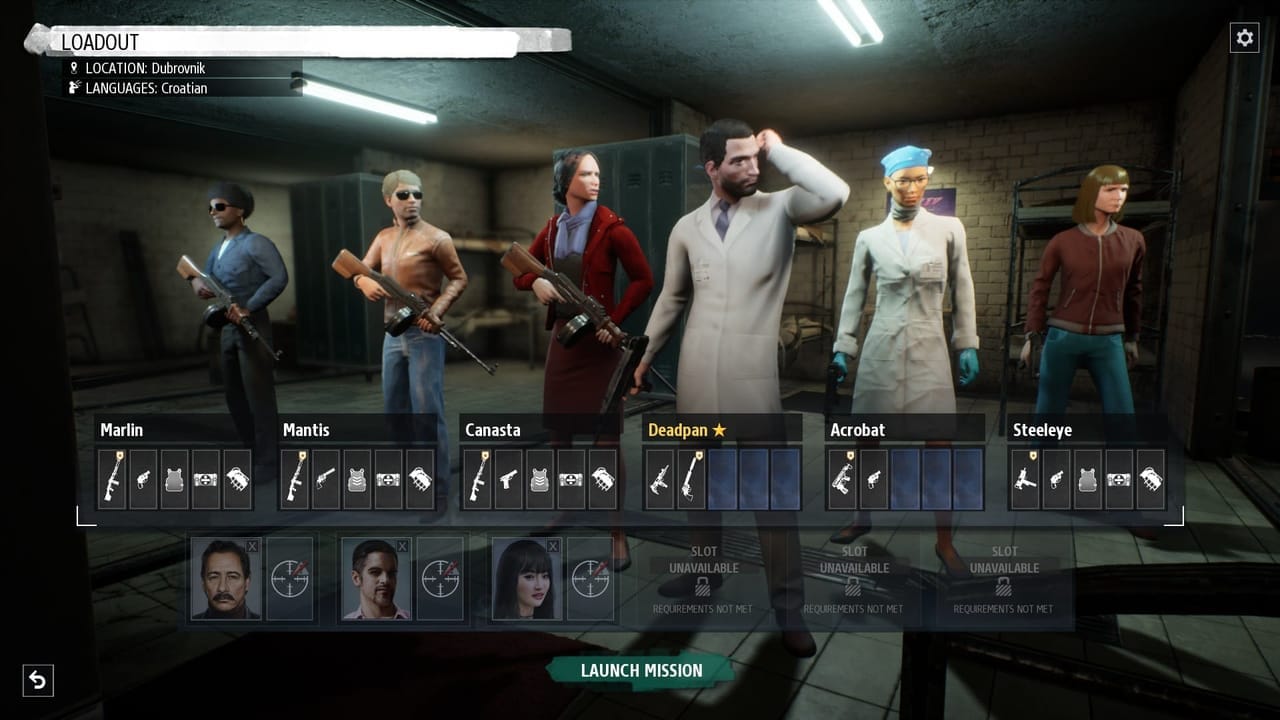
Stealth is highly challenging, working in tandem with the turn-based systems that make it reactive. It gets less challenging if you use disguised agents, in which case you can pretty much walk around freely and do as you please, as long as you don’t get caught doing something suspicious. Some agents have an Actor perk so they can never be detected when under disguise. Agents without that perk will be detected only by enemy agents, not their henchmen. So it's best to use disguises sparingly, mainly to disable cameras and laser tripwires. That way your undisguised agents can step in and wreak havoc. Obviously, it will take quite a bit of save scumming to accomplish the best stealth results. Sometimes a full-blown alarm seems like an overreaction for some transgressions, like trespassing. A more reactive system to different types of transgressions would make stealth much more viable.
The developers advertised a 40+ hour single-player campaign, but I took almost 80 hours to finish it. When you finish the main campaign you unlock a Mossad agent, so there are two other options with different stories for a second and third playthrough. There is also an extended campaign mode that delves into even more details about the plot. I can easily see myself pouring a couple hundred hours in the single-player mode alone. There will also be a multiplayer mode on release, which has the potential for even more hours of playtime if done right. This is definitely a lot of bang for your buck.
Phantom Doctrine is a technically polished and almost exemplary title. It showcases a dominant display of talent for an irresistibly compelling and overarching narrative supported by highly complex and dynamic gameplay. It runs the risk of becoming too caught up in its own brilliance and losing a wider audience. I don’t think that would diminish its value in the least. This is the ultimate espionage simulator, and it reaches a high spot in my personal top ten turn-based tactical games.
Our Phantom Doctrine review was conducted on PC via Steam with a code provided by the developer. The game is also available DRM-Free via GOG. Multiplayer was unavailable during the review period and we will be covering the mode in a companion piece soon after launch.
Review Summary
Phantom Doctrine is a life-consuming espionage simulator that offers a deeply complex cluster of systems to explore. Its turn-based tactics gameplay is a feat of engineering that will offer players many hours of combat thrills and stealth schemes.
(Review Policy)Pros
- Complex, Dynamic Gameplay
- Excellent Player Agency
- Clever, Convoluted Narrative
- Exquisite Analytics Minigame
- Wealth of Replay Value
Cons
- “Enemy Activity” is a Necessary Evil
Have a tip, or want to point out something we missed? Leave a Comment or e-mail us at tips@techraptor.net
